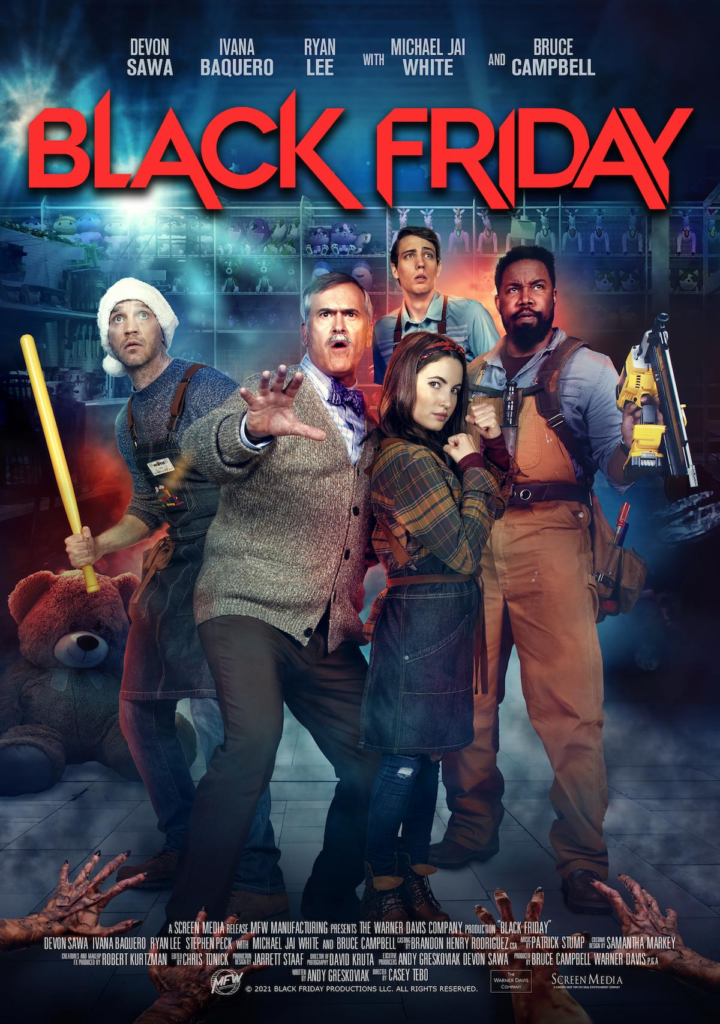
Table of Contents
Introduction
The fervor, frenzy, and magnetism of Black Friday have evolved beyond a mere shopping event; it now symbolizes the heartbeat of consumerism coursing through our urban settings. The film “Black Friday” takes us back to the 1990s shopping malls, shedding light on a crucial decade in the history of retail. This article delves into the movie’s narrative, its significance, and its depiction of an era marked by rampant consumerism.
History of Black Friday
Emergence
“Black Friday” originated in the 1960s as a phrase denoting the start of the festive shopping season after Thanksgiving. Over time, it evolved into a day marked by massive sales and bustling crowds. It traditionally follows Thanksgiving in the United States, drawing throngs of eager shoppers seeking discounted deals. The term gained traction due to the surge in retail profits, denoting the moment when stores transitioned from being “in the red” (indicating losses) to being “in the black” (signifying profits). Today, it’s emblematic of consumerism’s fervor, shaping the landscape of retail and ushering in the holiday shopping spree.
Evolution Over the Decades
Black Friday has transformed significantly from its modest beginnings to the colossal retail event it represents today. This evolution mirrors and is influenced by shifts within society. Initially a term coined for the post-Thanksgiving shopping rush, it has now grown into a retail extravaganza characterized by massive discounts and frenzied buying. This phenomenon reflects broader societal changes, with consumer behavior and commercial practices intertwining to create this cultural spectacle. As Black Friday continues to evolve, it remains a testament to the evolving dynamics between commerce and society, embodying both the influence of consumerism and the impact of societal shifts on retail traditions.
Impact & Influence
Economic Implications
Black Friday exerts a substantial influence on the economy, notably impacting retail sales and consumer expenditure. This annual event serves as a crucial driver for businesses, often leading to a surge in sales and revenue. The discounts and promotions offered during this period attract a considerable volume of shoppers, contributing significantly to overall consumer spending. The increased economic activity observed during Black Friday can have far-reaching implications, influencing company profits, inventory levels, and the overall financial health of the retail sector. Moreover, it sets the tone for the holiday shopping season, exerting a notable impact on the broader economic landscape.

Social & Cultural Impact
Black Friday extends beyond commercial transactions, permeating societal behavior and reflecting prevailing cultural trends and consumer habits. This annual event not only shapes shopping behaviors but also mirrors broader societal inclinations and preferences. The frenzy surrounding Black Friday embodies more than just consumerism; it embodies a cultural phenomenon, signifying a collective eagerness for discounts and bargains. The way people engage with Black Friday, from planning strategies to navigating crowded stores or opting for online deals, showcases societal trends in how individuals interact with commercial opportunities. It stands as a reflection of evolving consumer behavior and cultural norms, making it a notable marker in the contemporary social fabric.
Controversies
Consumerism
Critics contend that Black Friday exacerbates materialism and fosters a culture of excessive consumption. They argue that this shopping event amplifies the emphasis on acquiring material possessions and promotes a mindset centered around conspicuous consumption. The lure of discounted deals and the pressure to partake in the shopping frenzy may lead to impulsive buying and an overemphasis on accumulating goods, contributing to a culture that prioritizes possessions over other values. Critics highlight concerns about the environmental impact of heightened consumerism and the potential negative effects on individual well-being, citing Black Friday as a prime example of these issues within contemporary society.
Ethical Concerns
The quest for bargains frequently disregards the exploitation of labor and the environmental consequences. While consumers seek discounted prices during events like Black Friday, there’s often a lack of consideration for the labor practices involved in manufacturing these products. Additionally, the environmental impact of increased production, transportation, and waste generated during these shopping sprees is often sidelined in the pursuit of deals. This oversight in consumer behavior neglects the ethical and ecological implications of the products purchased, highlighting the disconnect between seeking savings and acknowledging the broader impact on labor rights and the environment.
Movie Overview
Synopsis of “Black Friday”
The film captures the essence of urban existence amid the frenzy of 1990s shopping excitement. It weaves together the stories of various characters from diverse backgrounds, depicting how they navigate their decisions amidst the bustling chaos of this era. The movie showcases the intertwining lives of these individuals, illustrating how they grapple with their choices amidst the bustling and frenetic atmosphere of the time. Through their diverse perspectives and experiences, the film offers a glimpse into the complexities of urban life during this period exploring how different characters respond and make choices within the bustling landscape of the 1990s shopping fervor.

Key Characters
The storyline revolves around the exploration of a controversial American shock jock, a desperate deaf girl, a homeless ex-soldier, and a young gang member. These characters constitute the central core of the narrative, each with their own unique and compelling stories. The film delves into the lives and experiences of these individuals, portraying their diverse backgrounds and the challenges they face within the broader context of the storyline. Through their distinct perspectives and circumstances the movie paints a multifaceted picture showcasing the complexities and intricacies of their lives as they navigate through the plot.
Themes Explored
Urban Life Representation
The film offers a multifaceted portrayal of urban life, presenting a diverse array of struggles, aspirations, and intersections. It showcases the complexities and variety of experiences within the urban landscape, depicting the challenges faced by different characters as they pursue their dreams and navigate through the intersecting paths of their lives. Through this kaleidoscopic lens, the movie provides a vivid and varied glimpse into the intricacies of urban existence capturing the diverse range of human stories aspirations, and challenges that intersect and intertwine within the cityscape.
1990s Shopping Experience
The film encapsulates a nostalgic era where shopping malls served as hubs for cultural exchanges and extravagant retail experiences. It vividly portrays a time when these malls weren’t just shopping centers but vibrant social spaces, bustling with diverse interactions and immersive retail spectacles. It captures the essence of an era marked by the significance of these malls in shaping cultural interactions, fashion trends, and consumer experiences. The movie beautifully reminisces about a time when these spaces were more than just retail outlets; they were vibrant community hubs fostering connections and setting the stage for memorable cultural moments.
Message & Reflection
Consumerism Critique
“Black Friday” mirrors our society, urging contemplation about our relentless chase after material possessions. The film serves as a reflection, prompting introspection regarding our insatiable desire for material goods. It highlights how this shopping event symbolizes a societal obsession with acquiring things, often overshadowing other values. By portraying the frenzy and fervor surrounding Black Friday, the movie encourages viewers to ponder the significance we attribute to consumerism and the potential impacts of our unending quest for possessions on our lives and society as a whole. It acts as a thought-provoking mirror, inviting us to reassess our priorities amidst the allure of materialism.
Societal Reflections
The film delves into deeper layers, exploring the societal consequences of hyper-capitalism and contemplating strategies to avert a grim future. It goes beyond surface issues, examining how hyper-capitalism influences society and raises concerns about its potential ramifications. Through its narrative, the movie sparks discussions about the potential pitfalls of an overly capitalistic society and urges viewers to consider ways to prevent adverse outcomes. By addressing these societal effects, the film serves as a catalyst for conversations on reimagining economic structures and seeking alternatives to ensure a more promising and sustainable future for all.

Conclusion
In summary, “Black Friday” provides more than just a cinematic experience; it encourages reflection on our association with consumerism. The film emphasizes the necessity for a thoughtful approach within our consumer-centric society. It goes beyond entertainment, fostering contemplation about our behaviors and choices as consumers. By highlighting the frenzy of Black Friday, the movie urges a more conscientious perspective, emphasizing the importance of mindful consumption and the impacts it has on our lives and the broader society. Ultimately, “Black Friday” serves as a catalyst, prompting viewers to reassess their relationship with consumerism and advocating for a more deliberate and mindful approach to consumption.
Do follow us on https://talkieflix.com/

I don’t think the title of your article matches the content lol. Just kidding, mainly because I had some doubts after reading the article.
Your point of view caught my eye and was very interesting. Thanks. I have a question for you.
Subject: Advertising Opportunity with TalkieFlix.com
Hi,
I hope you’re doing well.
I’m reaching out to discuss potential advertising opportunities with TalkieFlix.com. Our site is dedicated to Hollywood movies, providing updates, reviews, and insights. We believe your [advertising solutions/services] could greatly benefit our audience.
Let’s explore how we can collaborate. Looking forward to your thoughts!
Best,
[RAJESH THAKUR]
TalkieFlix.com
Thank you for the article. Really helpful! I learned many interesting things from this post. Continue the great content!
Thank you for your sharing. I am worried that I lack creative ideas. It is your article that makes me full of hope. Thank you. But, I have a question, can you help me?